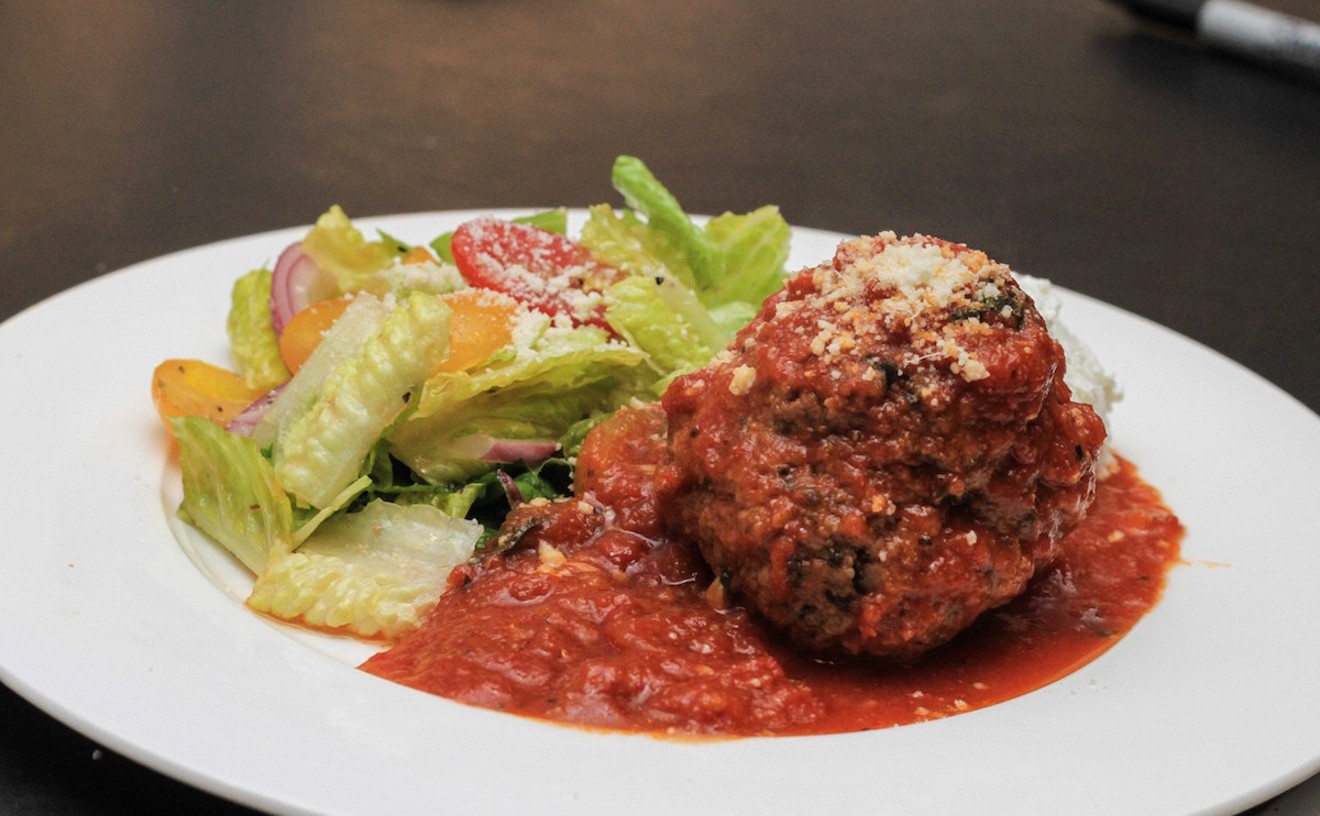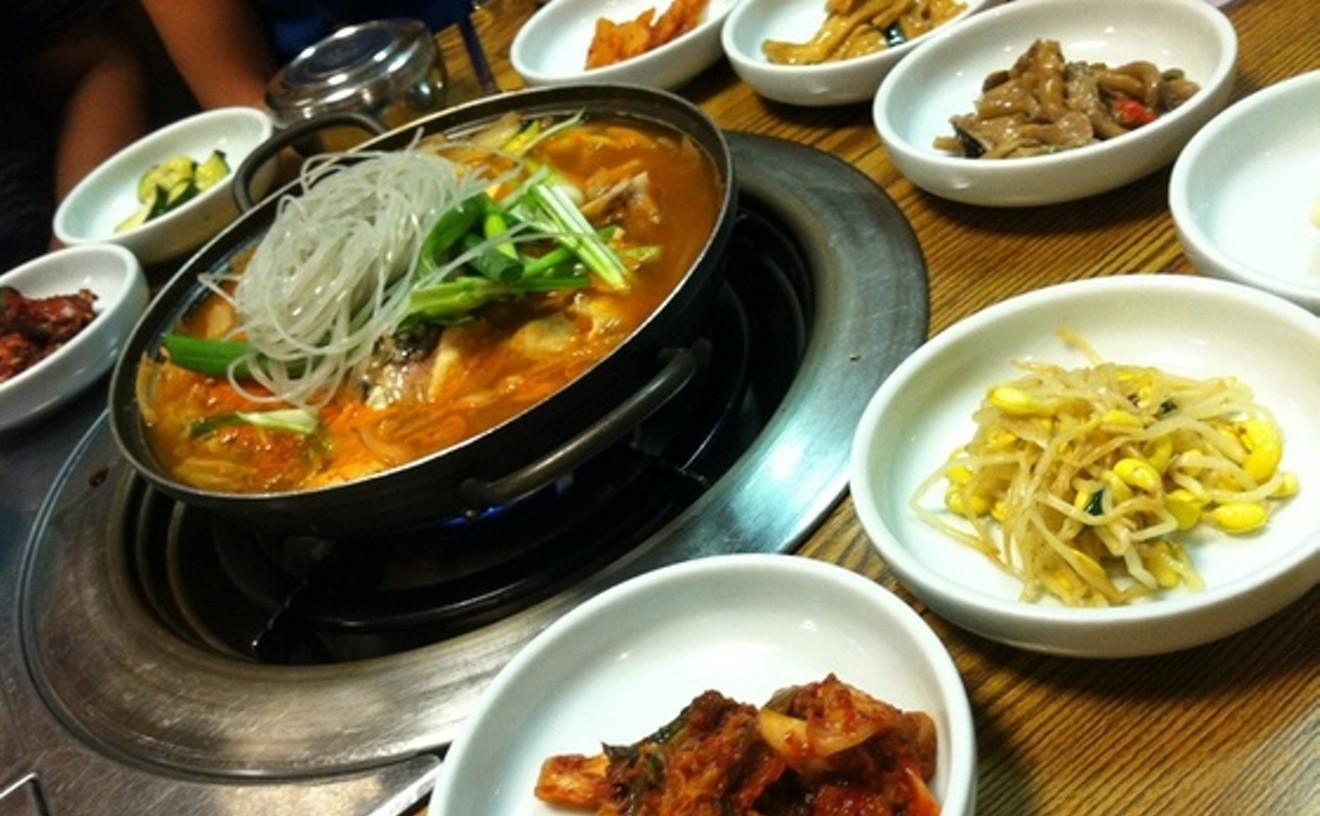According to the restaurant's owners, a Dutch pot is the only way to produce authentic Jamaican cooking. The pot heats up at an even temperature, making the food consistent — and here, consistently awesome. What started in 1998 as a single-burner oven in the backyard has morphed into one of the best — and most inexpensive — eateries around. Here and at the two other locations, lunch specials cost less than $10. That includes a platter of spicy jerk chicken or pork served alongside a pile of rice, peas, and plantains. If jerk isn't your thing, there's also curry goat, akee, catfish, liver and onions, and callaloo. Caribbean-style sides offer a taste of something different, from fritters and boiled bananas to "bammy" — a traditional Jamaican cassava flatbread.
Best Jamaican Restaurant
The Dutch Pot

- 6029 Kimberly Blvd., North Lauderdale, 33068 Map
- 954-979-1915
- dutchpotrestaurants.com/north-lauderdale/
Best Cuban Restaurant
Mario's Catalina Restaurant

Co-owner and chef Mario Flores went to great lengths to create a menu with dishes that combine the best of Spanish and Cuban fare, selections that work to complement each other and highlight both cultures. The restaurant is best-known for its potent mojitos, homemade sangria, tender roast pork, ground-beef empanadas, and hefty corn-scented tamales. The crowd here is lively, and the air is heavy with the scent of garlic, grilled onion, and pepper. Main plates worth traveling for include the red snapper, rolled in ground plantain and topped with a handful of fresh shrimp; an Argentine-style skirt steak; and seafood-stuffed paella. The staff at this Fort Lauderdale spot is as sweet as the grilled plantains, the tres leches dessert, or the tiny cup of Cuban coffee at the end of your meal.
- 1611 N. Federal Highway, Fort Lauderdale, 33304 Map
- 954-563-4141
- www.catalinarestaurant.net/
Best Mexican Restaurant
Eduardo de San Angel

Chef-owner Eduardo Pria introduced ingredients like ancho chilies, and nopales (cactus paddles) to South Florida's upscale dining scene in 1993. Inside his eatery, amid colorful Mexican kitsch, you can sample unusual dishes like the achiote crepes stuffed with cuitlacoche (a fungus native to Mexico that grows on cornhusks); Florida blue-crab cakes with sweet yellow corn, napped in puebla mole and smoky chipotle sauce; and a cream of cilantro soup (which actually contains no dairy aside from the cotija cheese sprinkled on top). Pria's specials change often, and a daily new dish might include escargots sautéed with white wine and onions, or grilled nopales layered with marinated pork loin and achiote for a new take on bocadillo. For entrées, try something less Mexican but tasty and tantalizing: the trio of ruby-colored Colorado lamb chops brushed with cilantro-garlic oil and served with a wild-mushroom-stuffed tamale and a miniature cornhusk boat of puréed black beans.
Readers' Choice: Rocco's Tacos
- 2822 E. Commercial Blvd., Fort Lauderdale, 33308-4206 Map
- 954-772-4731
- www.eduardodesanangel.com
Best Peruvian Restaurant
J28 Sandwich Bar
Fast, casual, and delicious — J28 Sandwich Bar is a hot spot to get a bite by the beach and sample some Peruvian fare with American flair. Most South Floridians are familiar with Cuban food, but if you haven't tried a home-cooked meal from Peru, a trip to J28 is an easy way to get your taste buds wet. Established by two friendly brothers, Marco and Javier, this small but inviting restaurant offers pork, beef, and chicken prepared Peruvian style and served on a freshly baked bun. Most popular on the menu is the chicharrón — thick slices of pork belly with pickled onion, mayo, and boiled sweet potato. Munch on the sandwich with a side of roasted corn or potato salad, and wash it down with chicha — a purple maize drink with a touch of pineapple juice and hints of clove and cinnamon. Sure you could go to a Publix or Subway, but why?
- 1854 N. Young Circle, Hollywood, 33020 Map
- 754-208-2902
- www.j28sandwichbar.com
Best Indian Restaurant
Madras Café

Indian food is becoming increasingly easy to find. Recently, the first outpost of California-based KASI Indian Food opened in Boca Raton — fast-casual dining à la Chipotle but with a helluva lot more curry. Still, most of the Indian food sold in South Florida — like masalas and tandoori — comes from the country's northern region. Madras Café, however, specializes in southern Indian cuisine like dosa, papdi chaat, and biryani. Recipes from the south use more exotic spices — amchoor (dried mango), saunth (dried ginger), and anardana (crushed pomegranate seeds) — as well as hotter chilies. They also lean vegetarian, with lentils factoring into sambar (a dish tempered with whole spices and chilies), rasam (a hot-sour soup dish), and poppadoms (deep-fried, crispy pancakes). Round out your meal with some sweetness, the most popular dessert being dahi vada (lentil cakes dipped in a mild coriander- and cumin-spiced yogurt) fried into dense doughnuts and paired with the restaurant's syrupy-thick chutneys.
- 1434 S. Powerline Rd., Pompano Beach, 33069 Map
- 954-818-0217
- www.madrascafe.net
Best Italian Restaurant
Cafe Martorano

Cafe Martorano is a picture of Staten Island meets New Jersey cool. A black, horseshoe-shaped bar is the focal point of the room, flanked by an open kitchen on one side and a DJ booth on the other. Both booth and stove are the domain of owner Steve Martorano, who likes to spin tunes as much as he likes to make Sunday gravy. The burly cook (he doesn't like to be called "chef") specializes in Italian-American classics: eggplant stack ($23), chicken cacciatore ($34), and bucatini carbonara ($26), all served in oversized portions. The food is tasty and the portions generous, and if you're a transplant from New York or New Jersey, it tastes like home. But it's Martorano who sets this restaurant apart from other Italian joints. The chef's personality is as big as his biceps, and when he's in the room, all eyes are on him. As the evening progresses, so does the decibel level, until you're not sure whether you're in a restaurant or a club in Bensonhurst. You might even get a glimpse of some of Martorano's celebrity friends like Mario Lopez, Tom Jones, and Shaq, who drive and fly in to see the king of the meatball.
Readers' Choice: Casa D' Angelo
- 3343 E. Oakland Park Blvd., Fort Lauderdale, 33308 Map
- 954-561-2554
- www.cafemartorano.com/
Best German Restaurant
Checkers Old Munchen

Sausage, wiener, pretzels with mustard, and beer. Lots and lots of beer. You'll get all this and more at Checkers Old Munchen. The restaurant looks as though you've arrived in the Bavarian capital and serves platters of meat and German beer in giant glass mugs and boots. The small restaurant is lined with beer bottles and decorative steins and anchored by a worn, copper-topped bar. A friendly staff will be eager to pour you a pint of the good stuff, be it hoppy Spaten Pilsner or dark Franziskaner Dunkel. What the place lacks in terms of modernity, it makes up for with plenty of sauerkraut, bratwurst, and spaetzle. With a beer selection that runs more than 60 deep and a kitchen turning out authentic grub, Checkers succeeds in transporting you back to Old Munchen any day of the week.
- 2209 E. Atlantic Blvd., Pompano Beach, 33062 Map
- 954-785-7565
- www.checkersoldmunchen.com
Best Chinese Restaurant
Toa Toa Chinese Restaurant

This longtime Sunrise eatery has been serving dim sum to Asian and American families in West Broward for more than 25 years. Here, there's no pushcart from which to cull your options. Instead, mark off choices on a small checklist. Your food will arrive a little later — hot and freshly made. Start with pork-filled sticky buns or steamed dumplings stuffed with juicy shrimp. Then move on to shareable platters like steamed mustard greens finished with a squirt of plummy hoisin sauce. Exotic options like chicken feet, duck tongues, and jellyfish salad are available for more adventurous diners. A favorite is the Singapore Noodles, stir-fried, curry-infused rice noodles that arrive in a heaping platter with fat shrimp and strips of red-rimmed pork, stir-fried along with bean sprouts, egg, and onion. The dish pairs perfectly with the restaurant's other dim sum, a collection of dumplings, sautéed greens, and skewered beef. The selection and quality guarantees a packed house on weekends, when the neon "Hong Kong Style Dim Sum" sign lights up in front.
Readers' Choice: Kapow! Noodle Bar
- 4145 NW 88th Ave, Sunrise, 33351 Map
- 954-746-8833
- www.toatoadimsum.com/
Best Japanese Restaurant
Saito's Japanese Steakhouse
All hibachi restaurants are not created equal. That's incredibly apparent when you step into the Saito's Japanese Steakhouse Coconut Creek location. Nestled inside the rapidly growing Promenade shopping plaza, this Saito's sits in a festive spot surrounded by lots of postmeal entertainment choices. Saito's offers the traditional live hibachi experience, a children's hibachi, and a vibrant bar with top-shelf choices that would make a South Beach restaurant jealous. Amazing chefs put on performances that go beyond the average hibachi routine. Saito's is known for tender steak cuts and sushi options that are out of this world.
- 4443 Lyons Rd., Coconut Creek, 33073 Map
- 954-582-9888
- saitosteakhouse.com
Best Korean Restaurant
Gabose Pocha

In one mile-long stretch of University Drive, you can sample some of South Florida's best banchan, cook your own eats on a tabletop grill, and score a giant jar of kimchi. Best-known among the cluster of Korean eateries here is Gabose, a 14-year-old landmark and the final foray in a series of establishments opened by James Soonkuk Hong and Eunsuk Hong. Today, the restaurant is run by their daughter and her husband, Susan and Fred Kim, who recently opened Gabose Pocha next door. Pocha is Susan's interpretation of a Korean pojangmacha — dubbed pocha for short — a reference to makeshift tents that serve nothing but grilled meats and the country's popular rice liquor, soju. Today, the pocha is a sort of Korean gastropub. Servers converse softly in Korean; a fish tank housing live sea snails gurgles near the exposed kitchen; and Hyuna, a spunky Korean pop singer, croons from the speakers. Start with a shrub, a Korean cocktail made from fermented fruit, vinegar, and soju — a distilled rice liquor more reminiscent of vodka than sake. Specials sometimes include fresh catches straight from Korea, like nakji (octopus), abalone, and sea cucumber. The rest of the menu is known as anju — a series of small plates meant to be eaten with plenty of liquor. Each is exotic and unfamiliar and requires some explaining. If you're feeling adventurous, beef intestine and chicken gizzard are racy options. Or try the gol bangee, a spicy escargot salad with carrot, cucumber, and cabbage slaw dressed in a pasty-thick sriracha-style sauce.
- 4933 N. University Dr., Lauderhill, 33351 Map
- 954-999-0603
- www.facebook.com/Gabosepocha





